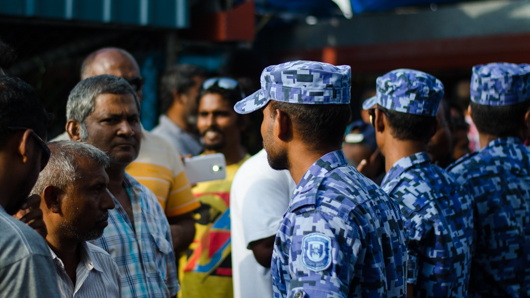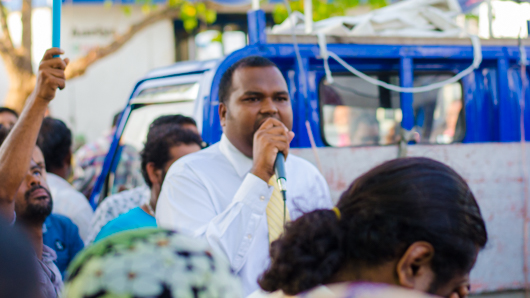Additional reporting by Ismail Humaam Hamid and Mohamed Saif Fathih
Over a hundred protesters gathered outside the Civil Court by the market in Malé this afternoon, as former President Mohamed Nasheed continued a legal campaign that stretches into its third year.
Inside, the Civil Court agreed to consider the challenge – rejected by the High Court earlier this week – into the legitimacy of the bench tasked with trying Nasheed for the January 2012 detention of Judge Abdulla Mohamed.
Tussles between police and protesters hinted at a return to the tension that became commonplace in the capital in the months before and after Nasheed’s controversial resignation from office just weeks after the judge’s arrest.
“The process that we saw in 2012. That appears to be happening this time,” suggested Maldivian Democratic Party (MDP) Spokesman Hamid Abdul Ghafoor from the protest today.
“We are certainly trying to wake up people to what is going on and it is our wish to inform people what will happen if we do not act,” he explained over the shouts of demonstrators.
Rising tensions on the streets in 2012 eventually saw security personnel turn on Nasheed’s government, with the MDP leader alleging his subsequent resignation was under duress.
Nasheed earlier this week called upon the people of the country to protest against their failed judicial system while party Chair Ali Waheed said today that the party would begin daily protests to defend the Constitution against persistent breaches.
Others, however, have suggested that the large scale anti-government demonstrations seen three years ago will not be repeated in 2015.
“We really don’t think that the past is going to come back,” said Ismail Asif of the Maldives National Chamber of Commerce and Industry (MNCCI). “The economy is picking up. People want to move on.”
Following the resurgence of street demonstrations since the decision of the formerly government-aligned Jumhooree Party (JP) with the MDP, the MNCCI called on authorities to stop such activities which might hinder local business.
Police attempts to clear a space from the space outside the court today saw protesters pushed into the market itself.
“We don’t feel that part of a democracy means any party should be allowed to block the streets,” said Asif.
He suggested that recent attendances at street demonstrations indicated that people preferred to go through the system, though he admitted the MDP leader Nasheed would still be able to draw large crowds.
The MDP’s Hamid said that the party intends to utilise both approaches, with “organised and sustained” direct action as well as efforts, via its new parliamentary alliance, to secure JP leader Gasim Ibrahim as Majlis speaker.
“We are trying to convince the public that if we do not take action now, we may not get another chance,” said Hamid.
The party sees the resumption of legal action against Nasheed as part of a wider move by the government to remove potential challengers to President Abdulla Yameen.
While government-sponsored amendments to the Constitution could disqualify JP leader Gasim on grounds of age, former defence minister Mohamed Nazim – himself a key player in events leading to Nasheed’s resignation – faces further charges of fomenting a coup, this time from the current government.
JP MP and former Police Commissioner Abdulla Riyaz – who stood alongside Nazim on the day of Nasheed’s resignation – has called the charges against Nazim “purely political” in nature, suggesting the police were attempting to frame the former minister.
During today’s demonstrations, MDP Chair Waheed said the party would be willing to work with its “political enemies” in order to defend the Constitution.
“People you would not expect to see on one platform will be seen together on February 27,” he claimed before dispersing today’s protest.
Hamid also explained that no one who wished to work with the opposition party would be turned away.
“We do not agree with how he [Nazim] has acted, but justice and rule of law should prevail. He has the right to due process,” he said.
Nasheed himself fears that the expedition of his case – which his party predicts will be pushed through before the introduction of the new Penal Code in April – will see him forced to campaign far from the streets of the capital.
“I will be even more active from block C of Maafushi Jail,” he told party colleagues this week.

